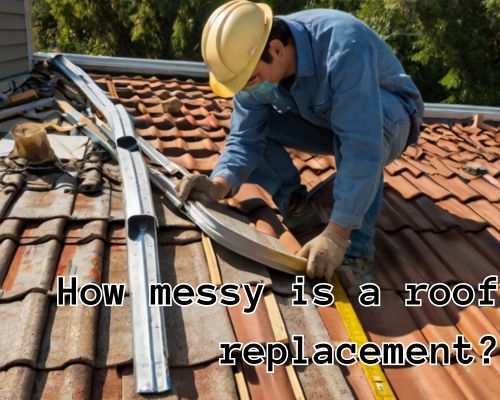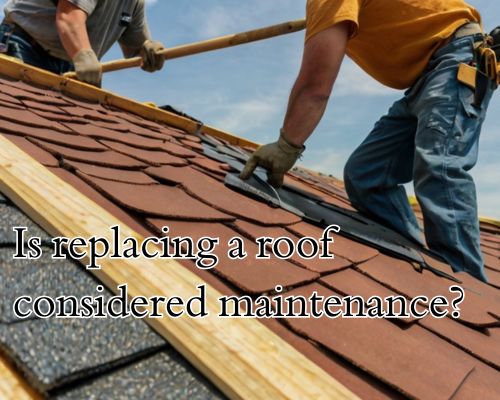A roof replacement is a major home improvement project that can dramatically enhance your home’s curb appeal, improve energy efficiency, and boost overall property value. However, one of the most common concerns homeowners have is just how messy the process can be. If you’re in New Jersey and considering replacing your roof, understanding what to expect in terms of debris, dust, and disruption can help you prepare effectively.

Understanding the Mess: What Happens During a Roof Replacement?
Replacing a roof involves multiple stages, each contributing to a certain level of mess and disruption. Here’s what you can expect:
1. Tearing Off the Old Roof
The first step in any roof replacement is removing the existing roofing materials. Whether your current roof consists of asphalt shingles, wood shakes, or metal panels, they all need to be stripped away. This process generates a significant amount of debris, including:
- Broken shingles
- Roofing nails
- Underlayment material
- Dust and granules
Roofing contractors like CJ Commercial Roofing NJ in New Jersey typically use tarps and debris chutes to minimize the spread of waste. However, some granules and smaller materials may scatter into your yard, flower beds, and driveway.
2. Structural Repairs and Preparation
Once the old roofing is removed, your contractor will inspect the decking for damage. If there are any rotted or weakened areas, these will need to be replaced, generating additional sawdust and wood scraps. During this phase, you may notice an increase in noise and vibrations throughout your home.
3. Installing the New Roofing System
The new roof installation involves laying down underlayment, flashing, and shingles. While this stage produces less debris, materials such as extra shingles, nails, and packaging from roofing components will still accumulate. New Jersey roofing companies often clean up as they go, but some minor mess may linger until the final sweep.
How Contractors in New Jersey Manage the Mess
Reputable roofing contractors in New Jersey understand the importance of minimizing the mess and disruption to homeowners. They implement several strategies to keep your property clean, including:
- Use of Dumpsters: Roofing companies bring a dumpster to your property to collect waste immediately.
- Protective Coverings: Tarps and plywood protect landscaping, windows, and exterior walls from damage.
- Magnetic Nail Sweepers: To ensure safety, contractors use magnetic sweepers to collect stray nails from your lawn and driveway.
- Daily Cleanup: Many professional roofing crews clean up at the end of each workday to prevent excessive buildup of debris.
How to Prepare for a Roof Replacement in New Jersey
While contractors take measures to control the mess, there are additional steps you can take to make the process smoother:
1. Move Vehicles Away from the Work Zone
If you typically park in the driveway, consider relocating your vehicle to avoid accidental damage from falling debris.
2. Protect Outdoor Furniture and Landscaping
Cover patio furniture, grills, and garden beds with tarps or move them to a safer location. If you have delicate plants, inform your roofing contractor so they can take extra precautions.
3. Secure Belongings Inside Your Home
The vibrations from hammering and nailing can cause wall decorations to shift or fall. Remove fragile items from walls and shelves before the project begins.
4. Notify Your Neighbors
Since roof replacements can be noisy and dusty, it’s courteous to inform your neighbors about the project, especially if they have outdoor plans during the construction period.
How Long Does a Roof Replacement Take in New Jersey?
The duration of a roof replacement depends on factors such as roof size, weather conditions, and material choice. In New Jersey, most asphalt shingle roof replacements take one to three days under normal circumstances. However, unexpected weather events, such as rain or strong winds, could extend the timeline.
Post-Replacement Cleanup: What to Expect
Once the new roof is installed, professional roofing contractors especially in CJ Commercial Roofing NJ will conduct a thorough cleanup, which includes:
- Collecting all debris and hauling it away
- Running a magnetic sweeper over the property to pick up nails
- Inspecting gutters and downspouts for stray materials
Some homeowners opt for a final power wash of their driveway and sidewalks to remove any residual dust or granules.
Common Concerns About Roof Replacement Mess
1. Will My Attic Get Dirty?
Yes, some dust and debris may filter into the attic, especially if the roof decking requires extensive repairs. Covering stored items with plastic sheets or old blankets can help protect them.
2. What Happens if It Rains Mid-Project?
New Jersey’s weather can be unpredictable, but professional roofers monitor forecasts and take precautions. If unexpected rain occurs, they will cover exposed areas with waterproof tarps to prevent leaks and damage.
3. Can I Stay Home During the Replacement?
Yes, but be prepared for loud noises and some disruptions. If you work from home or have pets sensitive to noise, you might consider staying elsewhere for the duration of the project.
Final Thoughts: Is a Roof Replacement Worth the Mess?
While a roof replacement can be messy, the long-term benefits far outweigh the temporary inconvenience. With the right preparation and a professional roofing company in New Jersey, you can minimize disruptions and ensure a smooth process. Investing in a high-quality roofing system not only enhances your home’s aesthetic but also improves energy efficiency and protects your property from harsh weather conditions.
If you’re ready to replace your roof in New Jersey, make sure to hire a licensed and insured roofing contractor with a proven track record of clean, efficient, and high-quality installations. By planning ahead and working with experienced professionals, you can enjoy a stress-free roof replacement with minimal mess and maximum results.

